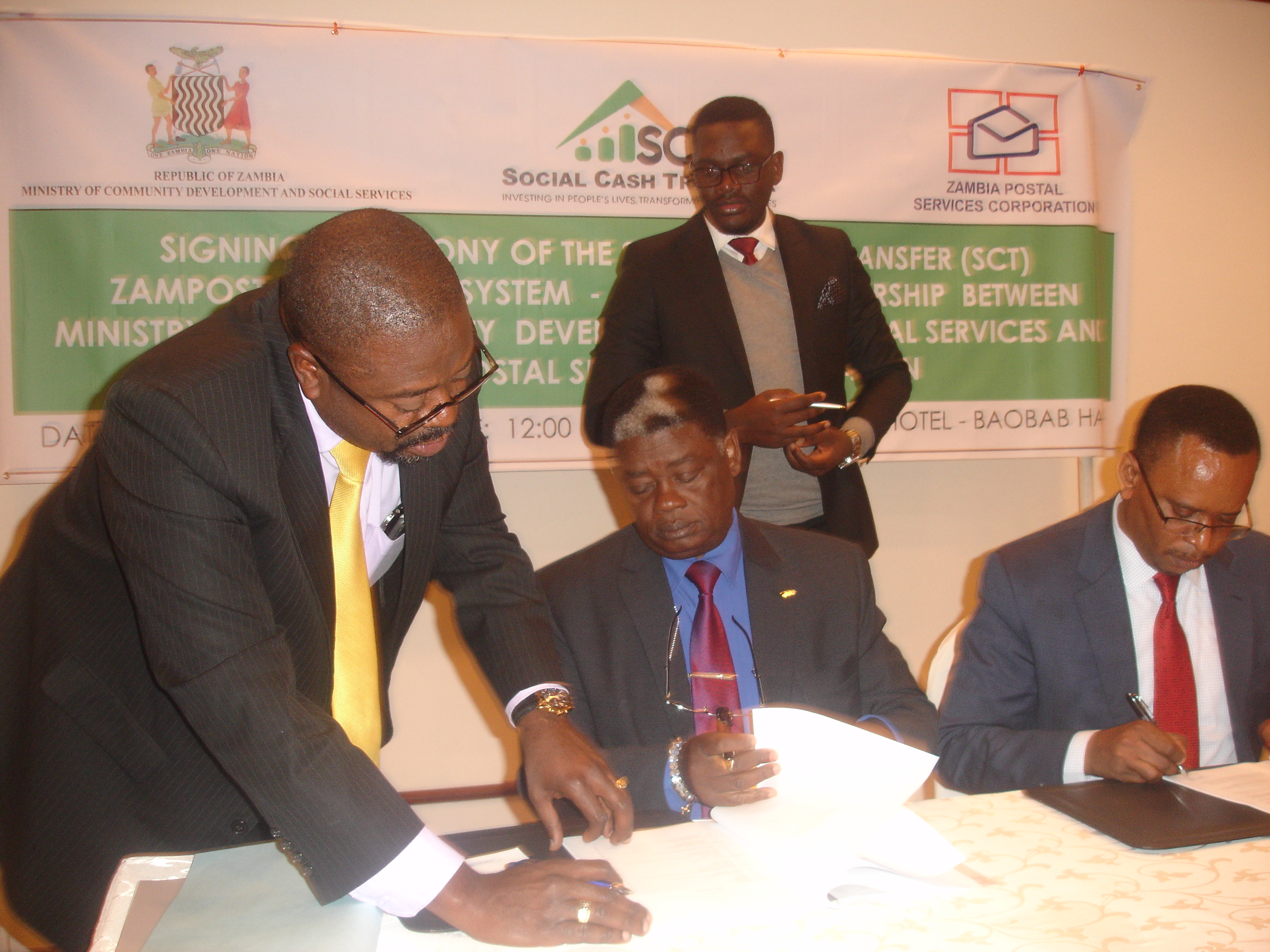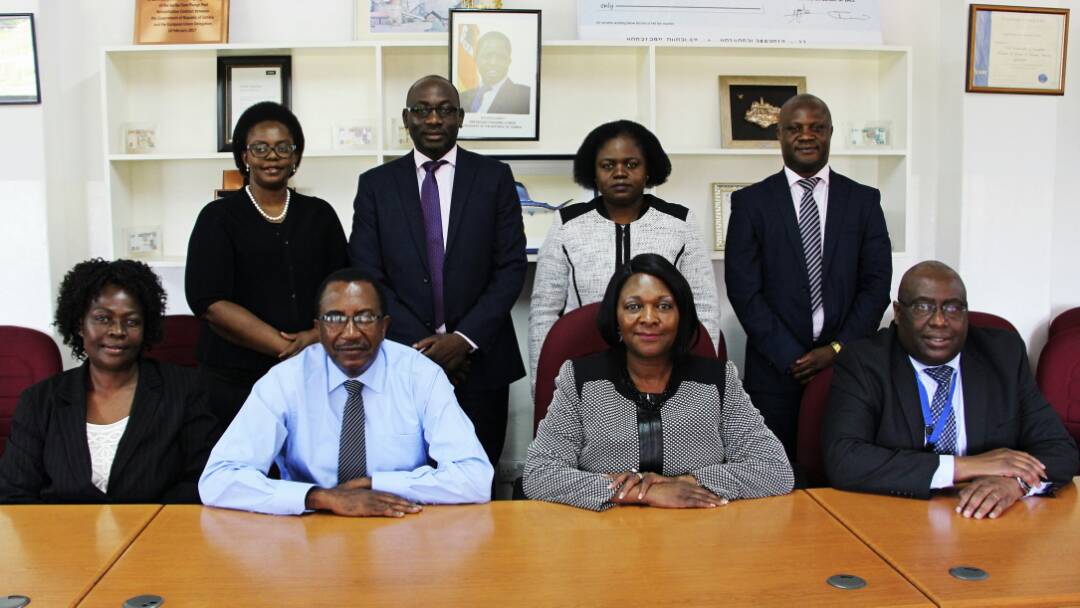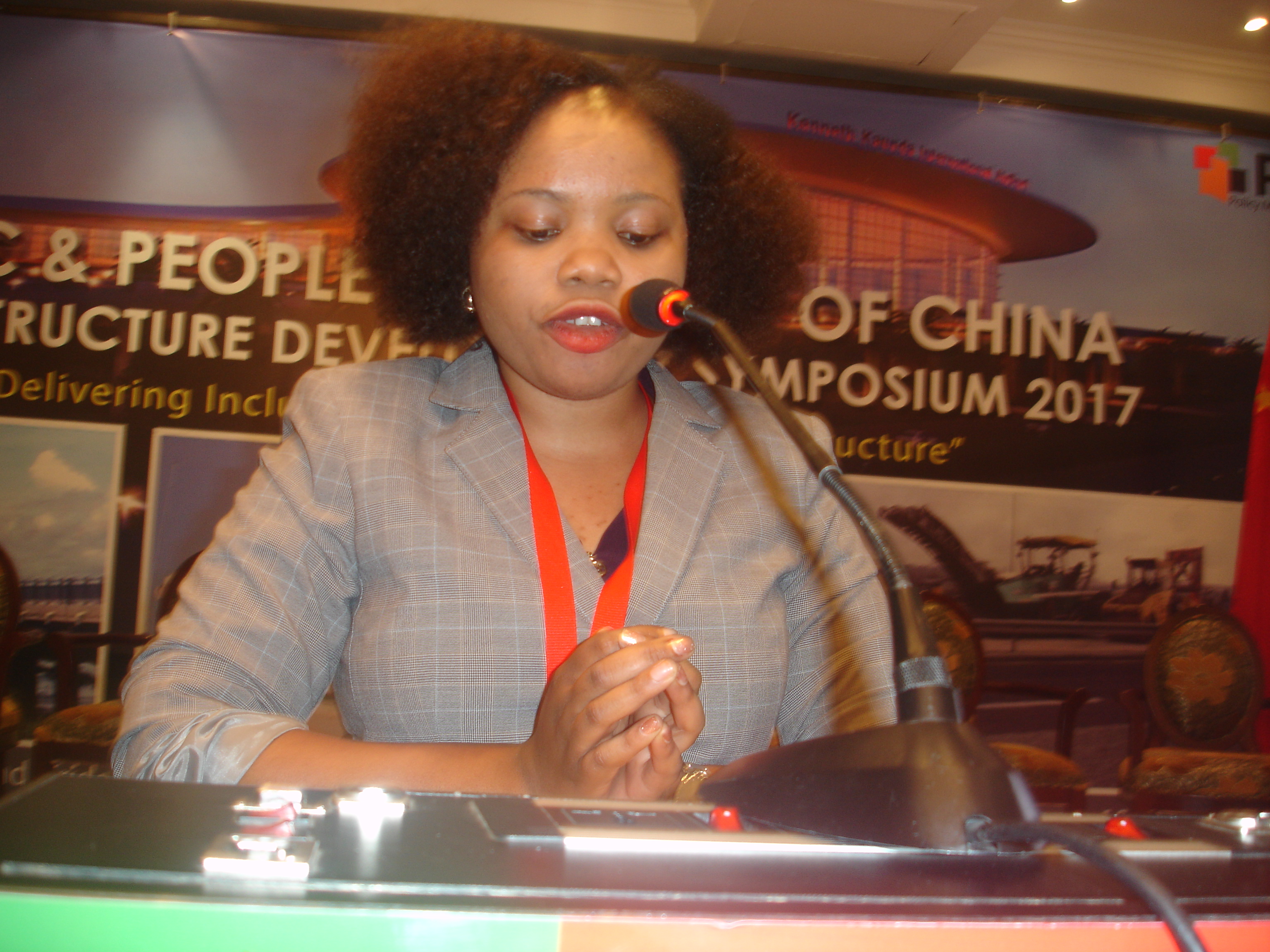Notice: Undefined index: catFilterList in
/home/zambi/public_html/wp-content/plugins/wp-likes/api.php on line
243
Post Views: 1,895
Bernadette Deka – PMRC Executive Director
Dear Friends & Colleagues

Bernaette Deka with President Edgar Chagwa Lungu and David Silwamba in Waldorf Astoria New York 2016
On Wednesday 17th October 2018, the President of the Republic of Zambia, His Excellency Mr. Edgar Chagwa Lungu held engagements with The Vice President of the World Bank Dr. Hafez Ghanem, Luapula Expo Investors and key Government officials on fundamental issues pertaining to the country. Below is our analysis on various key aspects of the economy that constituted part of the deliberations.
Social Protection (The Social Cash Transfer Scheme)

PERMANENT SECRETARY FOR COMMUNITY DEVELOPMENT AND SOCIAL SERVICES, REV. DR. HOWARD SIKWELA and ZAMPOST Post Master General Macpherson Chanda AT THE SIGNING CEREMONY OF THE SOCIAL CASH TRANSFER (SCT) ZAMPOST PAYMENT SYSTEM OF THE BENEFICIARIES OF THE SOCIAL CASH TRANSFER PROGRAMME HELD AT PAMODZI HOTEL
Social protection is considered a tool for poverty reduction mainly because it focuses on households that cannot meet their own needs, children living without adult care as well as women and children affected by various negative social vices such as violence. In alignment with the provisions of the 2014 National Social Protection policy we believe that

Joyce Nyama, Fredson Yamba, Minister Margaret Mwanakatwe & Dr. Emmanuel Pamu Kawama Goma-Simumba, Mukuli Chikuba, Joyce Nyama & Dr. Dick Sichembe.
a comprehensive social protection system is key to achieving successful poverty reduction.
In Zambia, the Social Cash Transfer scheme (SCT) remains one of the most widespread programmes aimed at poverty alleviation. The SCT Programme provides cash to poor households to reduce extreme poverty and inter-generational transfer of poverty. Government has been increasing the number of beneficiaries under the Social Cash Transfer Scheme with over 632,000 beneficiary households on the programme.
The 2019 National Budget commits that Government will maintain the target of 700,000 beneficiaries next year and will scale up the number in subsequent years. PMRC has been closely monitoring the impact of the SCT and several positive impacts have been demonstrated to date including reduced poverty in beneficiary areas, increased food security, improved child wellbeing, improved living conditions and asset ownership among others.
In view of the current administration lapses, abuse and mismanagement under the SCT, we state hereby that in accordance with the provisions in the Revised Public Finance Management Act 2018, we expect would be offenders to be dealt with according to the stiffer provisions of the revised Act.

Finance Minister , Hon. Margaret Mwanakatwe, who is also Lusaka Centre MP, pictured with her Husband Mpanga Mwanakatwe upon arrival at Parliament to Present the 2018-19 Budget
Further, in view of the challenges faced during the implementation of SCT in Zambia, PMRC recommends the following:
Increased capacity building for integrated management systems. Improved electronic management systems would provide for reduced duplication and effective targeting of beneficiaries thus prompting efficiency in the administration of the programme.
Increase incentives to community members. This will motivate individuals to volunteer and play an active role in the implementation and monitoring of the SCT program.
Additionally, adequate resource allocation towards the sector will provide for increased capacity, incentives to community members and increased target areas of beneficiaries.

Information Minister Kampamba, Mulenga Godfrey Malama, Amb Yang Youming at First China Zambia Media Awards 12 Dec 2017 pix by Derrick Sinjela
Government is currently implementing austerity measures and the 2019 National Budget is anchored on ensuring Fiscal Consolidation for Sustainable and Inclusive Growth. The Government is also in the process to firmly implement the Medium Term Debt Strategy [MTDS] and the Economic Stabilization and Growth Programme [ESGP]. The MTDS outlines measures to drastically reduce the rate of debt accumulation and attain a cheaper and longer debt maturity profile. The strategy also defines measures towards the refinancing of the three Eurobonds and dismantling of the stock of arrears. Under the strategy, the Government will also continue to utilise public private partnerships and joint ventures to finance projects and reduce the burden on the Treasury. This is the first time that such a good governance initiative has been implemented in Zambia.

Mutati with Mwanakatwe and Chimense
All these measures are aimed at a path that would promote growth for the country whilst also ensuring that the country is able to meet its required obligations such as debt repayment. PMRC calls for the enactment of critical policies under the medium term debt strategy such as; the Loans and Guarantees Act cap 366 of the laws of Zambia, which would be the mandate, used for the administration of the strategy. The Bill would further provide for enhanced oversight over the borrowing activities of the Government by having the National Assembly approve loans before they are contracted. Other critical legislation that needs to be enacted is: the Public Procurement bill as well as National Planning and Budgeting Act.
As PMRC, we maintain that the austerity measures being undertaken are critical towards achieving fiscal consolidation as premised in the 2019 National Budget and we have committed to working with the Government towards ensuring the following measures aimed at ensuring effective use of the available public resources are realised;

Special Assistant to the President for Press and Public Relations Amos Chanda with Zambia’s 6th Republican President Edgar Chagwa Lungu
Significant reduction in expenditure on administrative parts of the public service so as to prioritise allocations to key service delivery expenditures such as drugs;
Controlling the growth in the wage bill by restricting recruitment to only 3,500 frontline personnel;
Scaling down domestically financed capital expenditure by phasing the completion of existing projects. In this regard, projects that are at least 80% complete will be prioritised;
Increasing domestic resource mobilisation to 18.7% of GDP;
Curtailing domestic borrowing from 4 % to 1.4 % of GDP.
The International Monetary Fund (IMF) Bailout package
The importance of IMF package to Zambia cannot be overemphasized and as is the requirement of a homegrown economic recovery plan, Zambia scored a first by developing the Economic Stabilization and Growth Programme [ESGP]. PMRC’s recommendation is that the IMF bailout policy that focuses on measures such as economic adjustments, austerities and consolidation of the fiscal position should be prioritised. We are aware that Government is currently undertaking measures to rein in on fiscal slippages and risks related to debt. The Government is further working on the Economic Stabilization and Growth Plan, which is a springboard in our continued discussions with the IMF and this should also be premised in the upcoming discussions with the IMF next month.

US Ambassador to Zambia Daniel Lewis Foote at Mukuba House Monday 30 July 2018 pix b Derrick Sinjela
PMRC submits that Zambia needs an IMF package. We have been submitting to Government to pursue the IMF bailout programme for balance of payment support for as long as the bailout terms and conditions are favourable to all Zambians by consolidating growth. As a matter of fact, The IMF presents affordable finance and is significantly more affordable than commercial borrowing from domestic and international markets and thus PMRC encourages the Government to continue perusing an IMF package that compliments our home grown Economic Stabilization and Growth Programme [ESGP]. The IMF package would further compliment the Government through technical assistance on fiscal management as well as offer external accountability of fiscal and growth policies for the country. In view of the foregoing we also commend The Ministry of Finance for instructing all ministries to concentrate arrears dismantling to areas that will significantly reduce non-performing loans and release liquidity to the private sector;

Catholic Bishops in Zambia have elected Reverend George Lungu, Bishop of Chipata Diocese as President of the Zambia Conference of Catholic Bishops (ZCCB)
Capacity Building – Auditor Generals (AG) Office
The World Bank has offered additional support for capacity building to institutions responsible to fighting corruption (e.g. Office of the Auditor General) and others, to enhance accountability and transparency in the use of public funds in order to restore confidence by donors. PMRC is confident that this support to the AG’s Office and other offices will enhance ongoing efforts towards the fight against corruption. PMRC continues to advocate for increased capacity building in organisations such as the office of the AG in its annual analyses of the AG’s reports. Another strategic realignment that we have observed is the elevation of the office of the Chief Internal Auditor to the level of Permanent Secretary, giving the office more power to execute various tasks advancing accountability and transparency. PMRC is of the view that this decision is necessary in order to promote accountability of government resources and to strengthen the levels of internal controls. PMRC continues to play its role by conducting seminars and workshops for key enforcement bodies and the media respectively, to enhance capacity in execution of their respective mandates.
Policy and Structural Reform
The Government has made revisions to the Public Finance Act of 2004 to strengthen laws and regulations and make them more punitive to abusers of public funds. This provides a clear framework for dealing with cases of abuse of public resources and deter would be offenders. This further improves decision morality, transparency, accountability and integrity among persons in positions of responsibility. PMRC also emphasizes that the Planning and Budgeting Bill must be enacted to ensure adherence to planned programmes and enhance budget credibility. Once enacted these laws will also support provisions of the Public Finance Act and protect the governance of our public resources.

Bernadette Deka at PMRC Zambia China Construction Forum 12 October 2017 at Taj Pamodzi Hotel in Lusaka pix Derrick Sinjela
Conclusion
PMRC remains hopeful that the upcoming engagements with the IMF will result in a positive outcome and is pleased to note that the World Bank has pledged more support towards Zambia, specifically with technical expertise and support in the renegotiations and restructuring of Chinese concessional loans. In view of the 2019 National Budget premised on fiscal consolidation, it is very prudent that the Ministries Provinces and Spending Agencies (MPSAs) all adhere to provisions of the Revised Public Finance Management Act to ensure that funds are not abused to frustrate the budget implementation. PMRC further submits that the Crediting Reporting and Public Private Partnership Bill, the Planning and Budgeting Bill, new Procurement Bill and the Loans and Guarantees (Authorization) Act remain very critical legislation towards realising our commitments as outlined in the National Budget and the Economic Stabilization and Growth Programme [ESGP]. PMRC is committed to ensuring that it provides evidence based research and policy analysis to compliment the Government in the pursuit of prudent macroeconomic policies and reforms to place public finances and debt on a sustainable path, increase the economy’s resilience to shocks, and achieve higher and inclusive growth.
 Be the first to like.
Be the first to like.































